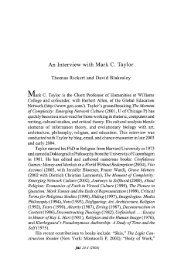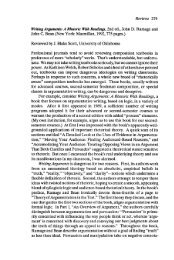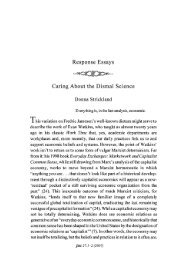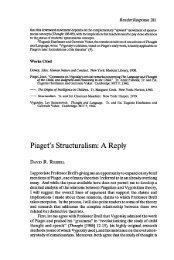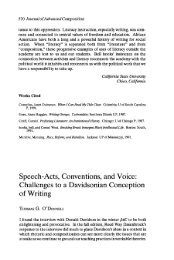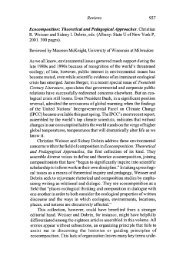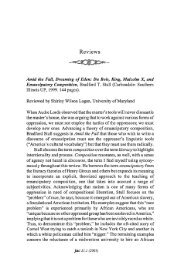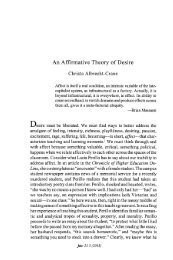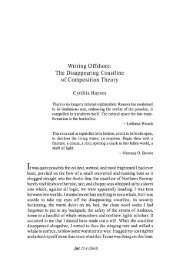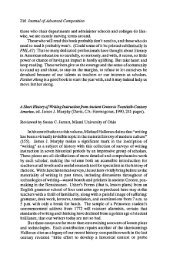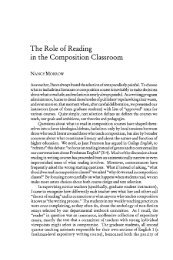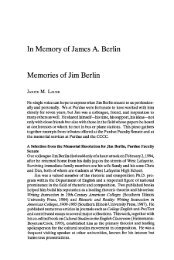Politics, Pedagogy, and the Profession of Composition ... - JAC Online
Politics, Pedagogy, and the Profession of Composition ... - JAC Online
Politics, Pedagogy, and the Profession of Composition ... - JAC Online
You also want an ePaper? Increase the reach of your titles
YUMPU automatically turns print PDFs into web optimized ePapers that Google loves.
146 jac<br />
this argument on a faith in structuralist determinism (similar to <strong>the</strong><br />
argument for fur<strong>the</strong>ring <strong>the</strong> proletarianization <strong>of</strong> writing instructors to<br />
provoke <strong>the</strong>ir resistance), <strong>the</strong> argument is politically noxious in that it<br />
consigns to greater suffering those students who are targeted for oppression<br />
ra<strong>the</strong>r than those who make this argument.<br />
None<strong>the</strong>less, Tuman's critique <strong>of</strong> <strong>the</strong> class basis <strong>of</strong> "open"<br />
pedagogies foregrounds several principles that I have been arguing are<br />
crucial to underst<strong>and</strong>ing <strong>the</strong> relation <strong>of</strong> politics to work in composition.<br />
First, pedagogies touted as an escape from power relations may well<br />
simply allow for <strong>the</strong> greater sway <strong>of</strong> dominant power relations. Second,<br />
<strong>the</strong> politics <strong>of</strong><strong>the</strong>se <strong>and</strong> o<strong>the</strong>r pedagogies can be understood only in terms<br />
<strong>of</strong> <strong>the</strong> material <strong>and</strong> historical contingencies <strong>of</strong> <strong>the</strong>ir enactment. These<br />
contingencies include not just characteristics <strong>of</strong> students but also <strong>the</strong><br />
specific circumstances <strong>of</strong><strong>the</strong> economic <strong>and</strong> social pressures <strong>and</strong> practices<br />
in which students <strong>and</strong> teachers work. Even <strong>the</strong> politics <strong>of</strong> <strong>the</strong> pedagogy<br />
Petrosky describes cannot be understood strictly in terms <strong>of</strong> <strong>the</strong> exercise<br />
<strong>of</strong> teacherly authority over students. As Petrosky acknowledges, since<br />
this pedagogy <strong>of</strong> recitation <strong>and</strong> drill leads to a solution to <strong>the</strong> Delta's "most<br />
pressing problem-getting students out <strong>of</strong> <strong>the</strong> Delta <strong>and</strong> into postsecondary<br />
education or <strong>the</strong> military"-it might well be seen not as <strong>the</strong> oppressive<br />
imposition <strong>of</strong> a restricted literacy but as evidence <strong>of</strong> "a sophisticated<br />
literacy at work in a large social <strong>and</strong> political sense" (65; emphasis<br />
added). Similarly, Tuman's analysis shows how pedagogical techniques<br />
<strong>of</strong> "openness" may operate to ensure <strong>the</strong> privilege <strong>of</strong> middle-class<br />
students <strong>and</strong> may betray working-class students. Moreover, by stressing<br />
process, individual initiative, flexibility, <strong>and</strong> interpersonal cooperation,<br />
such techniques may reinforce <strong>the</strong> ideology increasingly dem<strong>and</strong>ed in <strong>the</strong><br />
workplace (Tuman 46). For example, <strong>the</strong> organizational structure <strong>of</strong> what<br />
James Paul Gee, Glynda Hull, <strong>and</strong> Colin Lankshear term <strong>the</strong> "new work<br />
order" <strong>of</strong> "fast capitalism" emphasizes egalitarianism over hierarchy <strong>and</strong><br />
defines work in terms <strong>of</strong> projects on which people work coUaboratively<br />
before moving on, as independents, to o<strong>the</strong>r businesses <strong>and</strong> o<strong>the</strong>r proj ects<br />
(58-59). Knowledge <strong>and</strong> authority, ra<strong>the</strong>r than residing in one worker, are<br />
distributed, both as an efficiency measure <strong>and</strong> as a means <strong>of</strong> ensuring that<br />
workers cannot take <strong>the</strong>ir knowledge elsewhere. Control over newly<br />
"empowered" workers is <strong>the</strong>reby exerted indirectly ra<strong>the</strong>r than directly<br />
(60). Thus, <strong>the</strong> very attributes <strong>and</strong> practices encouraged in some ostensibly<br />
"emancipatory" pedagogies-"empowerment," "collaboration,"<br />
"teams," "self-directed learning," <strong>and</strong> so on-may well work to produce<br />
subjectivities dem<strong>and</strong>ed by fast capitalists <strong>and</strong> <strong>the</strong>reby prepare students



